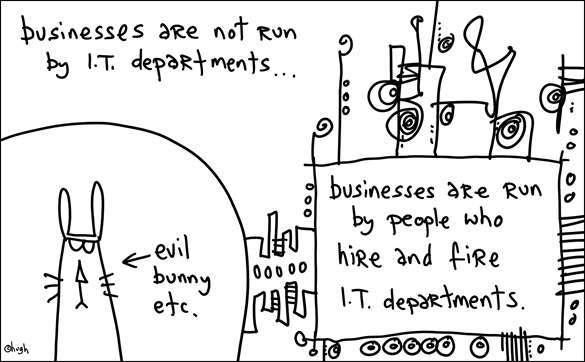Optimization - or how long will some jobs last.

Hugh's Cartoons seem get straight to the heart of the matter. Service functions like Accounting, IT, Personnel, PR and Purchasing don't deliver product and they don't influence customers to buy it. They are there to help the others to do get on with their jobs. How do you assess whether they're delivering or not ?
When I first heard about "Corps I/O" I had no idea what it meant or why I should be interested. I learnt that it wasn't I/O in the sense of input/output but "Core-infrastructure optimization". Still: who cares it's just a Buzz-phrase... isn't it ? I've talked before about confusing language making people switch off. Late last year Eileen got someone to explain it in plain language for the whole our team. If you're work in IT, this model is about how well an IT department does its job, whether your job is worth doing and will it be there in a couple of years. It came up again last week in Athens. So here's my take on it....
The ideas in our model aren't new, we've used other work in the field - notably by Gartner. However some of documents are still written in "Gartner-speak."
- It's not about the brand or version of technology you use. Buying the latest from Microsoft isn't optimization. Old technology, can be done well and new technology can be done badly.
- Looking at an organization's skills and the ways it uses product features (its processes) we can assess how well IT is optimized.
- We have 4 levels of classification "Basic", "Standardized" ,"Rationalized" and "Dynamic" - personally I find these names unhelpful. Our infrastructure datasheet puts more helpful labels on them.
Basic="We fight fires",
Standardized="We're gaining control",
Rationalized="We enable business",
Dynamic="We're a strategic asset" - A worrying number of companies are stuck at the "Basic" level.
We have an on-line self assessment, but here's a "pop quiz" way to see where you sit. Complete the ten sentences below; the more your answers come from the right the more "basic" your level, the more they come from the left the more Dynamic.
| The rest of my company .... | involves the IT department in their projects | accepts IT guys have a job to do | tries to avoid anyone from IT |
| My team... | all hold some kind of product certification | read books on the subject | struggle to stay informed |
| What worries me most in the job is... | fire, flood or other natural disaster | what an audit might uncover | being found out |
| My department reminds me of... | 'Q branch' from a James Bond movie. | Dilbert's office | trench warfare |
| Frequent tasks here rely on... | an Automated process | a checklist | Me |
| What I like about this job is... | delivering the on the promise of technology | it's indoors and the hours are OK | I can retire in 30 years. |
| If asked about Windows Vista I... | can give a run down of how its features would play here | repeat what the guy in PC world told me | change the subject |
| New software generally is... | an opportunity | a challenge | something we ban |
| My organization sees "software as a service" as a way to... | do more things | do the same things, more cheaply | do the same things without me. |
| Next year this job will be... | different | the same | Outsourced. |
When the subject came up in Athens, one of the other evangelists said "Our IT professionals don't like to talk about it - they see it as a stick to beat them". To me that sounds like saying "Sure we could deliver a better service, we just hope if no-one talks about it we'll keep getting away with the status-quo".
More information here.